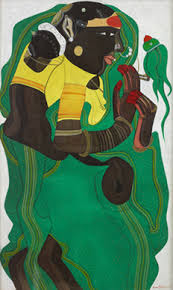Of
Temples
The hierarchical
divisions of the society had its origins in Kerala by the end of the eighth
century. Some people were made slaves and untouchables. Even a chance sighting of these unfortunate human beings vitiated the persona of the elite. Temples had a pivotal role
in establishing this social order. The system had a pretty long run 1100 AD to
1950 AD. The temples were fabulously rich on account of enormous land holdings,
inventory of gold and silver, contributions in precious stones, cash etc. Devaswam
and Brhmaswam as they call it. The upper crest who were at the helm of affairs
by virtue of their knowledge about rituals got the reigns of control and the ownership
changed hands. Art and literature which also centered around temples were not
spared. The usurpers took it all, kept it under their strict custody. Freedom and innovations were unthinkable.
With power
on their side, they dictated terms and people mentioned above were banned from
walking through public thoroughfares bordering the temples.
Poet
Kumaranasan describes the scene thus,
 |
| sujith s n |
തൊട്ടുകൂടാത്തവർ തീണ്ടിക്കൂടാത്തവർ
ദൃഷ്ടിയിൽ പെട്ടാലും ദോഷമുള്ളോർ
Sree
Narayana Guru devised a unique strategy to counter the situation. A simple one,
that is.
മുള്ളുകൊണ്ട് മുള്ള് എടുക്കുക
Since
temples were used as the device for take-over, Guru decided that the same
device should be used to counter it.
 |
| sujith s n |
Cleanliness
is godliness. Uphold personal hygiene, he stressed. It is the best antidote against untouchability. Who can say ‘No’ to a person , afresh after bath, walking
gracefully in clean clothes? Even if somebody does, the person won't be inclined. At the same time make sure that the body should neither be pampered nor tortured. The sensory organs are for optimum usage, i.e., no idle run for them. The person gets additional confidence if his/her words are clean. Qualities like straight-forwardness, compassion, Love, flexibility, courage, shyness, stable temperament etc clean the mind. Prior to that, the place where he/she resides should also be clean. The house must be energised by direct sun-light. It should be clean and airy. No waste material in and around the house. These sudhdhis add up to five, i.e., related to body, speech, mind, food and environment.
Guru never
envisaged temples as mere places of worship. Cultural and moral advancement should be made possible simultaneously. High edifices , arches etc. which invariably make the visitors
too tiny and insignificant are unnecessary.
On the contrary, temples need spacious, airy halls where satsangs can be
held.
Trees should be grown around. Gardens, a must. A library too. Books on
all religions should be made available.Nobody
should be allowed to use the space for tarnishing other religions.
In short, temple should be a rendezvous where
people can come any time of the day and unwind.
Narayana
Guru doesn't stop at this point. He is attaching a school and a skill-training center to
the temple complex.
 |
| sujith s n |
Everybody
irrespective of cast, creed, colour or religion is welcome.
He defines free
access as
ജാതിഭേദം മതദ്വേഷം ഏതുമില്ലാതെ സർവരും
സോദരത്വേന വാഴുന്ന മാതൃകസ്ഥാനം ...
And there
should be no show-off, he instructed.
കരിയും വേണ്ട , കരിമരുന്നും വേണ്ട.
He had clear-cut ideas about the
ulilisation of money. The income of a temple should be employed first for its
upkeep and the surplus is meant for greater common good, especially for the
education of bright students who are finding it difficult. He imagined a kind
of public charitable trust (സഭ) for asset management.
Though he installed several
idols, he was not a worshiper in the real sense. Apart from the revolutionary
angle he had an idea to wean away ordinary mortals from occult practices like bloodletting.
In 1921, he installed a three-tiered
lamp as idol in the temple at Karamukku.
 |
| sujith s n |
Vilakku is Laxmi, the harbinger
of Aiswarya.
Someone in the audience was still
not convinced. He asked,
One simple lamp is enough?
Pat came the response.
If you feel it is not enough, supplement
(the oil-lamp) with pictures of great persons. They will be treated as Gods in
future.
*********
